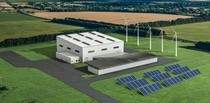BASF to build commercial scale battery recycling black mass plant in Schwarzheide, Germany
- Annual processing capacity of 15,000 tons of EV batteries and production scrap
- BASF will close the loop from end-of-life batteries to CAM for new batteries, enabling a circular economy and reduced CO2 footprint
- Plant will be built to the highest EHS standards
BASF will build a commercial scale battery recycling black mass plant in Schwarzheide, Germany. This investment strengthens BASF’s cathode active materials (CAM) production and recycling hub in Schwarzheide. The site is an ideal location for the build-up of battery recycling activities given the presence of many EV car manufacturers and cell producers in Central Europe. This investment will create about 30 new production jobs, with startup planned for early 2024.
Black mass production is the first step in the battery recycling process and is based on mechanical treatment of the batteries. The produced black mass contains high amounts of the key metals used to produce CAM: lithium, nickel, cobalt and manganese. It will be the feedstock for the commercial hydrometallurgical refinery for battery recycling that BASF plans to build mid of this decade.
“With this investment in a commercial scale battery recycling black mass plant, we take the next step to establish the full battery recycling value chain at BASF. This allows us to optimize the end-to-end recycling process and reduce the CO2 footprint,” said Dr. Peter Schuhmacher, President, Catalysts division at BASF. “The closed loop from end-of-life batteries to CAM for new batteries, supports our customers along the entire battery value chain, reduces the dependency from mined raw materials and enables a circular economy.”
Battery recycling is an important lever to reduce the CO2 footprint of battery electric vehicles, and is key to meet ambitious, circularity-driven policy requirements, expected under the proposed EU Battery Regulation. These will cover recycling efficiency of lithium-ion batteries, as well as material recovery and recycled content targets for nickel, cobalt and lithium.
About BASF’s Catalysts division
BASF’s Catalysts division is the world’s leading supplier of environmental and process catalysts. The group offers exceptional expertise in the development of technologies that protect the air we breathe, produce the fuels that power our world and ensure efficient production of a wide variety of chemicals, plastics and other products, including advanced battery materials. By leveraging our industry-leading R&D platforms, passion for innovation and deep knowledge of precious and base metals, BASF’s Catalysts division develops unique, proprietary solutions that drive customer success. Further information on BASF’s Catalysts division is available on the Internet at www.catalysts.basf.com.
About BASF
At BASF, we create chemistry for a sustainable future. We combine economic success with environmental protection and social responsibility. Around 111,000 employees in the BASF Group contribute to the success of our customers in nearly all sectors and almost every country in the world. Our portfolio comprises six segments: Chemicals, Materials, Industrial Solutions, Surface Technologies, Nutrition & Care and Agricultural Solutions. BASF generated sales of €78.6 billion in 2021. BASF shares are traded on the stock exchange in Frankfurt (BAS) and as American Depositary Receipts (BASFY) in the U.S. Further information at www.basf.com.
About BASF Schwarzheide GmbH
BASF Schwarzheide GmbH has been part of the BASF group since 1990. More than 2,000 employees produce specialized chemicals at the production site in Lusatia. The product portfolio ranges from polyurethane based products and systems, crop-protection agents and water-based coatings to engineering plastics, foams, dispersions, Laromer brands and from 2022 also battery materials. With these high-quality products that contribute to a more sustainable future, BASF Schwarzheide GmbH helps its customers to be successful.
BASF Schwarzheide GmbH assumes social responsibilities in the region, contributing to various areas from vocational training to co-siting activities. A dozen companies have already become co-siting partners with BASF, thereby benefiting from the multifaceted synergies of working together with an innovative chemical company and the experience and expertise BASF has to offer.
For more information, please visit www.basf-schwarzheide.de.

The Schwarzheide commercial scale battery recycling black mass plant will allow BASF to optimize the end-to-end recycling process and reduce the CO2 footprint
